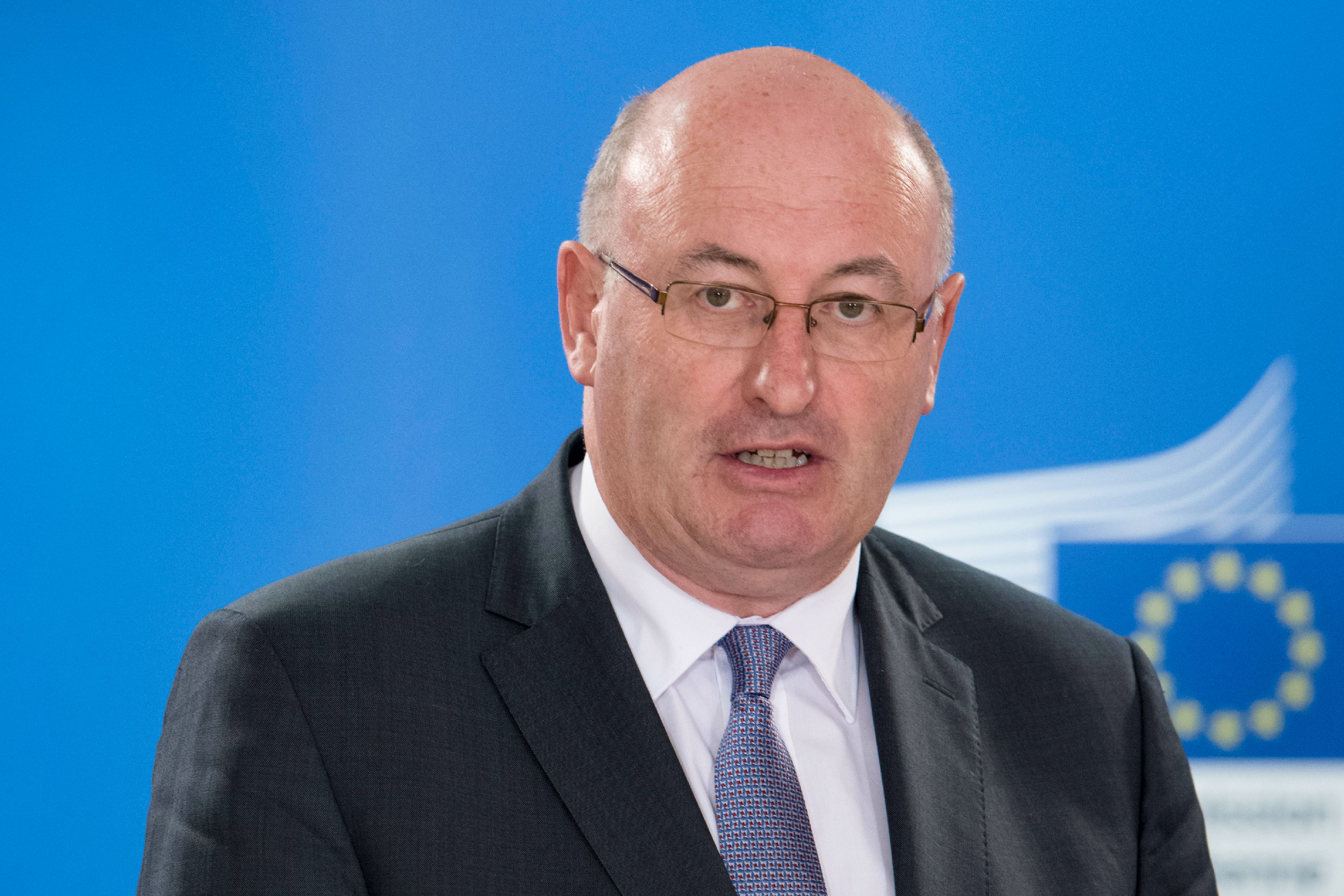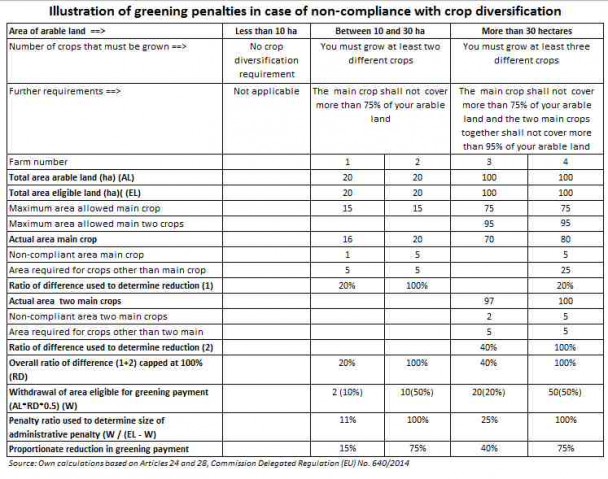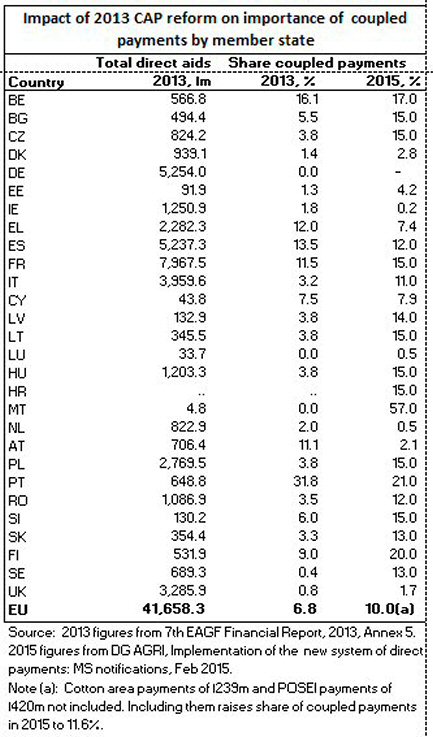In May 2016, at an informal AGRIFISH Council meeting, the Dutch Presidency will discuss the CAP post-2020. A mere 2.5 years after the last reform (finalised in December 2013) and just after the first execution of the new First Pillar payments and Rural Development Programme schemes in 2015, a new round of discussions about the rationale, goals, measures and impacts, of the CAP is already beginning; in effect, a new CAP reform.
Entering the first phase of reform, we may assume that the formation of political decisions and new legislation will take place in familiar stages. In the first stage, everything goes; it is marked by diverse and opposing opinions of Member States, think-tanks, interest groups and individuals. The menu is likely to include everything from the CAP’s complete abolition through radical or gradual changes to few or no changes; mainly, significant efforts will be directed towards keeping the policy alive – at all cost.
This phase, during which many will naïvely come to believe in the emergence of a long-awaited different, better CAP, will be followed by a strategic proposal in the form of a Commission Communication. As always and inevitably, it will waiver between keeping old and introducing new elements, depending on the political-economic setting, as well as the technical quality and political power and charisma of the Commissioner and his team. The proposal is likely to surprise us with new wording and justification, but what will be truly surprising is if form does not prevail over substance. Given the long-term shifts of power within the European institutions and the Commission’s consequent lacking political willpower and sometimes also professional manpower for the development of truly new ideas, it is unrealistic to expect much more from the next attempt at keeping alive the CAP and its main mechanisms.
The next predictable element to follow is the decision-making process and negotiations within and between the legislative bodies. It is a fact, confirmed during the last reform, that it is here, in the ordinary (former codecision) legislative procedure, that the conservative Agricultural Ministers and Parliamentary Rapporteurs additionally weaken the already-feeble basic logic of CAP change. At the moment, we cannot really expect much else. Maybe this is too pessimistic; however, the weakness of the European institutions, reflecting that of the European idea itself, hampers bigger changes in all political fields, let alone in one so bound by interest-based logic and (very) real economic interests.
The timeline for the discussions to come is not yet determined. This round of CAP implementation is also to have some kind of CAP Mid-term review that might speed-up the reform process, as did the one during Commissioner Franz Fischler’s term in 2013. However, as Alan Matthews and other prominent agricultural economists have pointed out (Swinnen, 2015), we are more likely to see an extended cycle of the existing policy, coinciding in length with the Multiannual financial framework (2015-2020), while changes, if there are any, will be linked to setting a new Financial framework post-2020. And we are also well-acquainted with the manner in which the European Council negotiates matters of finance and policy: it is based on arguments of power, directed towards maintaining the status quo and marked by interests, resulting in cosy deals.
How strong is the CAP needs-objectives-measures linkage?
There is certainly enough time to reflect; and entering the first phase of discussions, we can temporarily set aside the normally narrow and interest-based political-economic CAP framework. Let’s be naïve. Let’s base our deliberations on the fundamental principles of modern public policy formation and on the idea that the purpose of policy is to achieve goals set to address social issues. Modern policies allegedly follow the principles of the policy cycle: determining needs for public/state intervention, setting goals based on those needs, choosing measures and then changing, improving, upgrading policy through the monitoring and evaluation of its implementation. The use of clear indicators, feeding back into the process of choosing goals and measures that reflect political-economic reality, is an imperative of this process.
Regardless of differences in the theory and understanding of phenomena, the policy cycle system has long been established and incorporated into business and works for macroeconomic policies. Views of economic schools and individuals regarding what constitutes good or bad inflation and GDP growth, as well as opinions as to the best combination of policies, differ, but the primary objectives, postulates and dilemmas have found their way into economic textbooks, while the system of indicators is set independently and lends a foundation to development and policy guidelines.
What is more, the EU has enshrined the policy cycle in its legislation, making it an obligatory element in the functioning and modification of policies. This makes sense, as addressing public interest, limited funds and piled-up problems (or, in contemporary terminology, ‘needs and challenges’) requires the use of the established, objective approaches of evidence-based policy.
How are the principles of modern public policy incorporated into the CAP? At first glance, everything falls within legal and substantive frameworks. We are able to discern general principles, appealing to most, of a sustainable CAP, emphasising the economic, environmental and socio-territorial dimensions of food production. The Commission justifies the current CAP with the provision of public goods linked to food production. The RDP seems to function in a contemporary, strategic and prudent manner, based on elements of the policy cycle. There are evaluation studies for certain First Pillar measures. Eurostat keeps track of a broad array of statistical indicators, there is a special system for monitoring the economic status of agricultural holdings (FADN), agriculture-related environmental indicators are under development. A myriad of institutions and individuals are working towards a more rational agricultural policy, towards the attainment of goals and the improvement of the condition according to societal needs.
So, from a distance, all is well; perhaps some realist will be of the opinion that the CAP policy cycle framework is in need of some improvements, but is generally headed in the right direction, especially compared with the past. My personal assessment of the situation is substantially more critical. Namely, I posit that there is a giant substantive abyss between the CAP’s general goals and its mechanisms. While there is some link to be found between the CAP’s goals and the priorities and measures of the Second Pillar, there are no operational and quantified targets for the CAP as a whole, and especially for the First Pillar (i.e., 60% of the policy’s budget).
I cannot shake the feeling that in this part, policy emerges from a kind of black box, where meeting the needs of society comes second to balancing the demands of the political groups that have so far profited the most from the CAP, i.e., specific countries and groups of farmers. Public goods, on the other hand, are defined loosely, if at all, have no determined value, and are basically a political catchphrase rather than a real strategic policy goal.
We will not state anything new by claiming that income redistribution and historical rights are the key mechanisms of the CAP, while the stated goals and priorities are hardly more than a framework for the justification of the policy’s perpetuation. Even the Commission admits in a way that there is no coherent goal-oriented intervention framework to the CAP.
It is our political reality that the evaluation following the last CAP reform (the first EC call already took place in 2015) will be the first comprehensive assessment of the CAP policy framework in history, and the first to consider both pillars at once. First discussing reform, then determining measures in the policy process and lastly finding a comprehensive conceptual policy framework – through outsourcing – does this not amount to an unbearable levity in the perception of public policy? Its political-economic pragmatism is eroding rationality, destroying the logic of particular policies along with it.
Why no new CAP concepts on the floor?
Ironically, this new CAP fails to satisfy any of the stakeholders. On the contrary, there is mounting frustration and we are likely to witness quite a few radical suggestions coming from all sides of the interest spectrum. Net payer countries are likely to be especially vocal again. The agricultural interest sphere or at least an important part of it – French farmers, dissatisfied with the current direct payments scheme – will attempt to enforce payments to compensate for price-related losses (‘counter-cyclical payments’).
Environmental groups, whose power is rising, both in the eyes in the public and through European bureaucracy, wish to direct the policy in a completely different direction – towards the provision of ecosystem services.
Aside from these well-known options, there is a marked lack of new concepts and fresh ideas. A policy gone as sour as the CAP cannot be resolved using democratic interest-weighing. This method has come to the forefront during the last reform, but is driving the policy into a cul-de-sac.
There is a need to reflect on the policy’s fundamental logic and purpose, possible directions and strategies. This must be creative intellectual work, not caught up in the past, and reaching outside the scope of the ordinary. Europe is in dire need of a new approach, a need that extends well beyond the field of agricultural policy.
The lack of creativity in the programming of modern agricultural policy is also limiting a strategic approach to the part of the policy with the highest societal impact, namely rural development policy. In most Member States and regions, RDP has also lost its freshness. Its formation has become a matter of routine, status quo perpetuation and an exclusive dialogue, or, to be more accurate, relationship of control, between European and national/regional administrators. Evaluation procedures are too much a matter of form, not substance, and only partially – if at all – address real societal needs. Often, if not primarily, measures are formed by merging administrative conditions with the interests of specific stakeholder groups.
What is the CAP actually addressing?
The weak assessment of actual needs is the most prominent deficiency of the entire policy. For many a societal priority, there are no analyses or data, while the indicator system is very generalised and difficult to translate into the intervention logic. It can be worrisome for critical observers to see evaluation stuck at the level of technical observations, forgoing serious in-depth analysis of the real impacts and effects of policy. It is taboo to question the political-economic system, thus reducing an important part of the policy cycle to no more than a routine procedure – a task to be fulfilled for its own sake. Without strong motivation and passion, adequate intellectual resources and professional expertise, we cannot expect the emergence of a better, targeted policy, tailored to meet actual societal demands.
The prevalence of interest-based negotiation and bureaucratic functioning are not the only obstacles to a strategic focus of current European agricultural policy. It is a perhaps somewhat radical hypothesis that we are yet to set an effective strategic framework, founded on a clear, well-elaborated system of indicators for the monitoring of societal goals. Such indicators do exist, but are used more or less sporadically, and are certainly not linked to policy goals. As the last reform has confirmed once more, income policy is an important, if not crucial, CAP tool.
A brief look at the distribution of budgetary funds by measures confirms that this is the most important part of the policy. But what does this mean? The objectives are unrelated to farm income. We wish to increase farmers’ incomes – which farmers and by how much? The EU possesses FADN data, which allow for aggregate economic calculations for agriculture that might yield a coherent image, but appropriate tools have never been fully developed, or used with this target in mind. In this field, we simply stumble into a fog of uncertainty, inconsistencies and a cloaca of economic and political interests of individual groups and countries. If there are no clear indicators and objectives in this field, the entire policy cannot be more targeted and tailored to societal demands.
The situation is not much better in other fields of agricultural policy. Agri-environmental statistics is still in the development stages, or else at the level of specific studies, a far cry from a comprehensive monitoring system. And for certain serious matters that call for a much greater level of policy intervention, like rural poverty, there are practically no reliable statistical data.
How to rationalise the CAP?
Bearing in mind the difficulty of analysing the full complexity of the relevant relations and structures, it is my opinion that during the next round of discussions regarding the future of the CAP, European institutions should not simply resort to searching for new concepts of measures. Rather, they should lay new, solid foundations for an evidence-based policy. The ‘greening’ calamity of the latest reform has taught us that a new, rational policy concept cannot emerge solely from the offices of those responsible or through the process of democratic confrontation of opinions, based on the past and balancing of interests.
Therefore, the EU should start anew and first develop a system of development indicators (or upgrade the existing one). When we start answering questions regarding what farm income is and who receives it, where and how farming affects the environment and what the rural vitality of all of Europe is, we can start setting new policy goals. What does society really demand of agriculture? How are these interests valued by society and how were they evaluated until now? European agricultural policy is created with too little regard for such considerations and it should first be brought down and grounded in evidence and arguments. All is not so grim, to be sure; there are already certain research projects and calls for evaluation projects that perhaps indicate that there is light at the end of tunnel.
Defining indicators is a necessary, but not sufficient, step towards policy modernisation. The EU must also develop a system to define the desired state as opposed to the existing one. Target values must be set, after which efficient mechanisms must be developed and implemented to achieve these objectives. These mechanisms must take account of the political-economic framework and act as a bridge between specific instruments and policy objectives.
A convention for a new CAP is needed
Only reflecting and beginning anew in this manner will allow a serious shift in the CAP, not simply changing it for the sake of change, constrained by past decisions (through path dependency) and interest-based logic. EU institutions must act objectively, creatively, with intelligence and integrity. No twisting of words, searching for new ones, no fingers crossed – this way, ministers and MEPs will prevent serious shifts; I am pretty sure that in the current balance of institutional power, the Commission as the (sole) responsible initiator of legislation will not be able to develop a significantly better policy. The new policy can only be constructed within a serious and legitimised institutional innovation – a convention for a better CAP.
Who might be able to develop such a concept? Such an entity should, first and foremost, have a mandate from all three European legislative bodies in order to be considered legitimate. This new concept cannot be some obscure study conducted by the Commission, or an opinion of the Parliament’s Agriculture Committee experts. A viable new framework could, on the other hand, take form in a strong think-tank comprised of individuals of different profiles (administration, policymakers, academia, stakeholders), representing different institutions, but appointed democratically and transparently.
To reform or not to reform is the question now!
Food, the environment and the countryside are questions of far too great importance for Europe’s development to leave their solving to short-term interest resolution. It is first necessary to admit that radical reform is needed, then set an appropriate framework to find proposals, one that does not negate political reality and complexity or the need to balance interests, but is founded on a strategic approach, facts and hard data, quantitative objectives and a selection of the best instruments available.
The current “Brexit” discussion additionally requires a thorough reflection on the functioning and reform of the Common agricultural policy. The European Union requires such a shift in its CAP, and, again, not only in this policy field. The return from pragmatism and rejection of populisms is only possible if we insist on the use of facts, objective analysis and synthesis. The time for such an approach is now; two years from now, when a new institutional round begins, it will be too late for the CAP.
The start of a new discussion regarding CAP reform opens up possibilities for thorough reflection regarding the goals, mechanisms and impacts of this ever-contentious European policy. Its conceptual framework must be rebuilt from scratch, based on generally accepted indicators and their connection to societally accepted goals. This can be made possible through a deep institutional innovation and a new strategic, systemic approach endorsed by the European institutions. All else will lead once more into interest-based compromises, maintaining of the system’s flimsy foundations and a ‘pseudo-reform’, doomed from the outset.
This post was written by Emil Erjavec.








